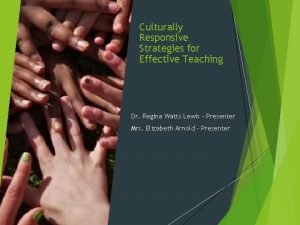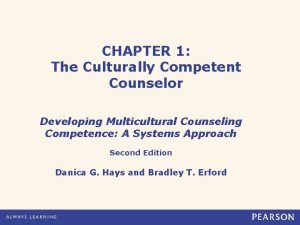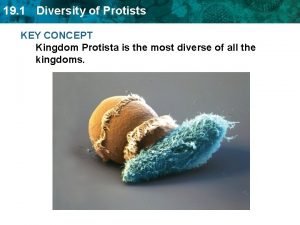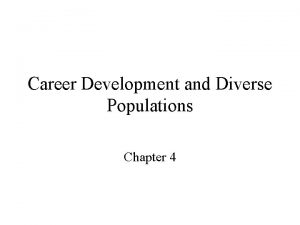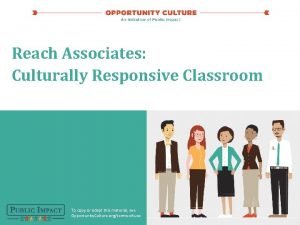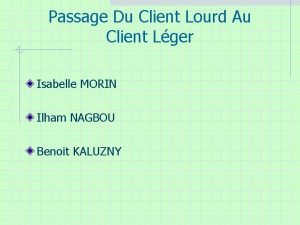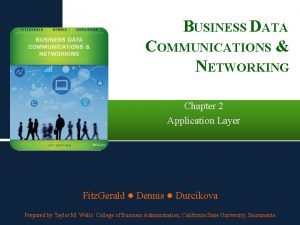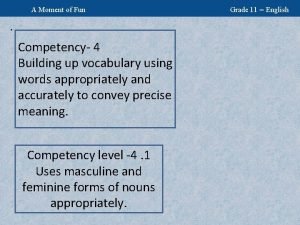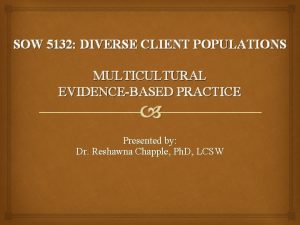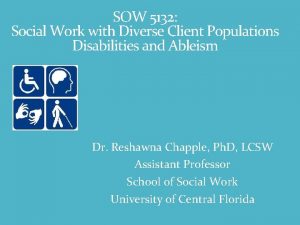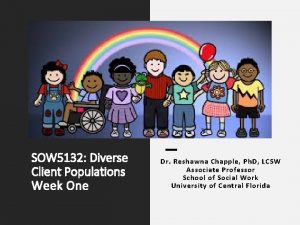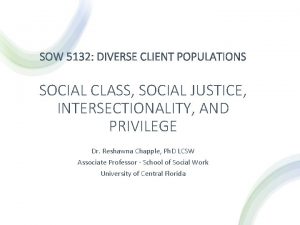SOW 5132 Diverse Client Populations CULTURALLY COMPETENT ASSESSMENT









- Slides: 9

SOW 5132: Diverse Client Populations CULTURALLY COMPETENT ASSESSMENT Presented by: Dr. Reshawna Chapple, Ph. D, LCSW

Therapist Variables Affecting Diagnosis Some common diagnostic errors include: Confirmatory strategy Attribution errors Judgmental heuristics Diagnostic overshadowing To guard against these, it is important for counselors to develop cultural competence (i. e. , knowledge, awareness, and skills).

Cultural Competence and Preventing Diagnostic Errors Self awareness Knowledge Multicultural skills

Contextual and Collaborative Assessment A collaborative approach The contextual viewpoint

Principals of Collaborative Conceptualization Proceed using the following steps: Use both clinician skill and client perspective to understand the problem. Collaborate and jointly define the problem. Jointly formulate a hypothesis regarding the cause of the problem. Jointly develop ways to confirm or disconfirm the hypothesis.

Principals of Collaborative Conceptualization Proceed using the following steps: Test out the hypothesis using both the client and the counselor as evaluators. If the conceptualization appears to be valid, develop a treatment plan. If the hypothesis is not borne out, the counselor and client collect additional data and formulate new, testable hypotheses.

Infusing Cultural Competence Into Standard Clinical Assessments Culturally Sensitive Intake Interviewers: Identifying information: Other than demographic information and inquiries about cultural groups to which the client feels connected, also ask about primary language use in the home. Presenting problem: Obtain his/her perception of the problem and be sure to consider issues such as prejudice or oppression. History of presenting problem: Get a chronological account of the problem and understand how cultural issues might be related to the problem. Psychosocial history: Be sure to assess social background, values, and belief (questions for inquiry are presented in the chapter). Abuse history: Always ask questions around physical, sexual, and emotional abuse history.

Culturally Sensitive Intake Interviews Strengths: Identify culturally relevant strengths such as pride in one’s identity or culture. Medical history: Assess medical or physical conditions that may be related to psychological problems; inquire about indigenous healing practices. Substance abuse history: Assess substance and alcohol use; ask questions about family history as well. Risk of harm to self or others: Assess harm and ask questions about clients’ emotional state.

Diversity Focused Assessment Diversity impact in the intake process: How can I help you? What do you think is causing your problem? Why do you think this is happening to you? What have you done to treat this condition? How has this condition affected your life?
 Culturally responsive vs culturally relevant
Culturally responsive vs culturally relevant Culturally competent counselor
Culturally competent counselor Working with culturally and linguistically diverse families
Working with culturally and linguistically diverse families Diversity among protoctista
Diversity among protoctista Gage definition
Gage definition Culturally responsive teaching self assessment
Culturally responsive teaching self assessment Client lourd vs client léger
Client lourd vs client léger Application layer
Application layer Thin client vs zero client
Thin client vs zero client Monk femine
Monk femine
